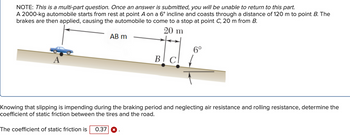
Newton's second law of Motion:
According to this law, the magnitude of the net force on an object of constant mass is given as,
where is the mass and is the magnitude of the net acceleration of the object.
Friction force:
The friction force is the force that is responsible for opposing any relative motion between two surfaces in contact. The friction force is given by the formula,
where is the normal force and is the coefficient of friction.
The acceleration of a rolling object on an inclined plane:
The acceleration of a rolling object along the inclined plane when the rolling friction and other resistive forces are neglected is given by the formula,
where is the acceleration due to gravity and is the inclination angle.
NOTE:
Trending nowThis is a popular solution!
Step by stepSolved in 6 steps with 1 images

- A crate of eggs is located in the middle of the flat bed of a pickup truck as the truck negotiates a curve in the flat road. The curve may be regarded as an arc of a circle of radius 33.8 m. If the coefficient of static friction between crate and truck is 0.610, how fast can the truck be moving without the crate sliding? Vmax= m/sarrow_forwardⒸ Macmillan Learning An engineer wants to design an oval racetrack such that 3.20 × 10³ lb racecars can round the exactly 1000 ft radius turns at 96 mi/h without the aid of friction. She estimates that the cars will round the turns at a maximum of 175 mi/h. Find the banking angle necessary for the race cars to navigate the turns at 96 mi/h without the aid of friction. 0 = This banking and radius are very close to the actual turn data at Daytona International Speedway, where 3.20 × 10³ lb stock cars travel around the turns at about 175 mi/h. What additional radial force is necessary to prevent a race car from drifting on the curve at 175 mi/h? radial force: Narrow_forwardCar A uses tires for which the coefficient of static friction is 0.281 on a particular unbanked curve. The maximum speed at which the car can negotiate this curve is 11.0 m/s. Car B uses tires for which the coefficient of static friction is 0.812 on the same curve. What is the maximum speed at which car B can negotiate the curve?arrow_forward
- Suppose a toy car experiences two horizontal forces: A time-dependent force from its motor of F = 2.0e-0.5tN, and kinetic friction with a coefficient of u = 0.1 from its wheels and bearings. What will its maximum speed be on level ground if it starts from rest? %3D %3Darrow_forwardTwo crates of fruit are released from the top of a ramp inclined at 30 degrees from the horizontal and 4.5 meter long. The two crates consist of an apple crate of mass 20 kg that is placed in front of a watermelon crate of mass 80 kg. The apple crate has a coefficient of friction of 0.20 while the watermelon crate has a coefficient of friction of 0.15. How long does it take the apple crate to reach the bottom of the incline if it needs to travel a distance of 4.5 meters?arrow_forwardCurrent Attempt in Progress A flatbed truck is carrying a crate up a hill of angle of inclination 8 = 8.90°, as the figure illustrates. The coefficient of static friction between the truck bed and the crate is μ = 0.380. Find the maximum acceleration that the truck can attain before the crate begins to slip backward relative to the truck. 0 W = mg Number i 18 1 (a) 7MAX +y mg sin e W = mg Units MAX mg cos e 0 +x (b) Free-body diagram of the crate Qu Nur with QL ML Q Οξξ Nu C N Warrow_forward
- 30° P 20° A 30 kg package is at rest on an inclined plane when a force P is applied to it. Determine the magnitude of said force (in Newtons) if 15 s are required for the package to travel 7.5 m up the inclined plane. The coefficients of static and kinetic friction between the package and the inclined plane are equal to 0.3arrow_forwardA hockey puck (mass = 2 kg) leaves the players stick with a speed of 20 m/s and slides on the ice before coming to rest.The coefficient of friction between the puck and the ice is 0.9. How far will the puck slide after leaving the players stick? marrow_forwardA man is driving his car with speed 49.0 mi/h on a horizontal stretch of road. (a) When the road is wet, the coefficient of static friction between the road and the tires is 0.102. Find the minimum stopping distance (in m). m == (b) When the road is dry, H, = 0.598. Find the minimum stopping distance (in m). marrow_forward